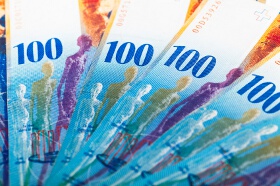
The Swiss franc is trading sideways on Thursday as consumer confidence fell to a 10-year low. With the survey suggesting that the Swiss anticipate higher unemployment and weaker economic growth, the Organisation for Economic Cooperation and Development (OECD) slammed the federal government for posting budget surpluses. But local businesses are more perturbed by subzero interest rates than a government that is saving money.
According to the State Secretariat for Economic Affairs, the consumer confidence index tumbled to -10.4 in the fourth quarter of 2019, down from -8 in the previous quarter. This is the lowest reading of the index since the third quarter of 2009. Ultimately, consumers are expecting deteriorating economic conditions and rising joblessness for the remainder of the year. But the index also revealed that consumers expect their personal financial situations to somewhat improve; many anticipate making a major purchase in the months to come.
The October unemployment rate is scheduled for release on Friday and the market is penciling in a 2.2% rate.
In other data, foreign exchange reserves climbed from $786 million in September to $789 million in October, reports the Swiss National Bank (SNB).
As the Swiss economy witnesses fault lines forming, the international community is gleeful. A new OECD report argues that the Swiss save too much and spend too little, despite possessing the third-highest gross domestic product (GDP) per capita of all OECD members.
The OECD wrote:
The budget surplus in the years 2017 and 2018, more than one percent of the gross domestic product.
Within the debt brake, there would be room to increase the expenditure. This would serve monetary policy, and economic and social positive impact.
But while Switzerlandâs economy is being hampered by global trade tensions, as well as anemic economic growth in Europe, Swiss businesses are more concerned about negative rates on the national economy. According to a UBS survey of 2,500 companies, two-thirds of respondents said the cost of subzero rates for the economy âoutweigh their benefits overall.â
UBS chief investment officer Daniel Kalt said in a statement:
What is remarkable, however, is that a majority of companies who generate over 50% of their business from exports believe that negative interest rates are harmful to the Swiss economy overall â especially because no end is in sight.
This comes as Thomas Jordan, head of the SNB, called the negative rates “essential.” The current benchmark interest rate stands at -0.75, and subzero rates have been in place since 2015.
The USD/CHF currency pair dipped 0.01% to 0.9927, from an opening of 0.9926, at 12:09 GMT on Thursday. The EUR/CHF rose 0.01% to 1.0998, from an opening of 1.0997.
If you have any questions, comments, or opinions regarding the Swiss Franc, feel free to post them using the commentary form below.